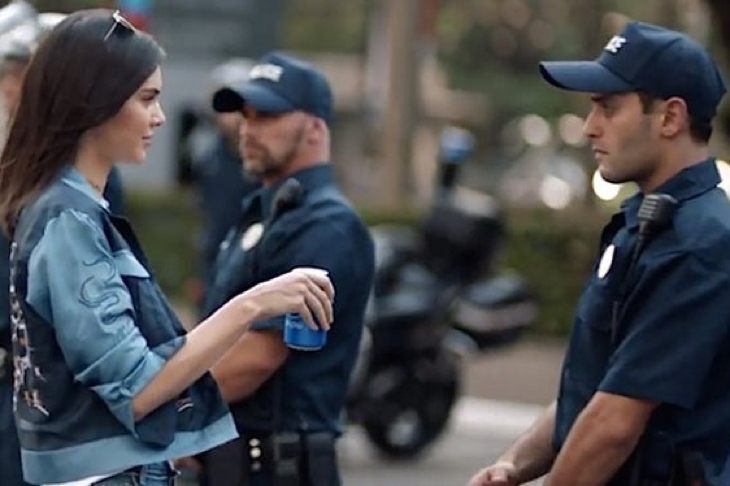No sooner had Pepsi skooshed open its latest ad campaign, the internet burped it back up. The soft drink giant’s new commercial features Kendall Jenner (ask a young person) emerging from a crowd of protestors to offer a can of Pepsi to an officer on a police line. The advert is more sugary than the fizzy beverage it hawks. A parade of suspiciously attractive demonstrators march through the streets of a US city, powered only by air punches and smugness.
Their cause is unclear — but the placards bear such subversive slogans as ‘Join the conversation’. A confrontation with the least intimidating cops this side of a Keystone silent is mercifully averted when Jenner shows up and charms an amenable bobby with a can of pop. Everyone does the ‘rock on’ fingers, and society’s ills are laughed out of existence. Safe to say the surviving members of the Chicago Seven needn’t worry about their legacy being overshadowed.
But outrage culture being what it is, the internet couldn’t settle for deriding Pepsi’s vanilla activism. On Twitter, where utterly conventional viewpoints will be praised for their bravery, Pepsi was condemned for ‘cultural appropriation’ of Black Lives Matter. Over at Vox, Pepsi was accused of exploiting the iconic photograph of Ieshia Evans facing down cops at a rally against police killings of unarmed African-Americans. BuzzFeed took its users to DEFCON Listicle, with no fewer than five posts on Jennergate. Only a day after launching it, Pepsi canned its campaign.
Of course, youth culture and the marketing industry have been feeding off each other since the 1960s. Jean-Luc Godard called counter-culture ‘the children of Marx and Coca-Cola’. The blending of radical politics and conspicuous consumerism reached its apex in 1971 when Coca-Cola debuted its ‘I’d Like to Buy the World a Coke’ ad. The commercial pegged itself to the hippie phenomenon and the resistance to the Vietnam War. It created the idea that drinking Coke was a vaguely virtuous thing to do. But the traffic isn’t only one-way. Many of the tools of digital activism have been imported wholesale from the world of viral marketing.
The sharply contrasting reactions to Coke ’71 and Pepsi ’17 says more about political culture than marketing. The flower-power generation might have rolled their eyes at the cynicism of Coca-Cola, but they understood that there were greater issues to rail against. The advert itself wasn’t the greatest issue of the day. They genuinely wanted to change the world and in meaningful ways. Modern identity politics isn’t about change but self-fulfilment and these people take themselves very seriously. So much so that a corny ad isn’t just a marketing gimmick; it’s an attack on who they are.
Stephen Daisley is a columnist for the Scottish Daily Mail.







Comments